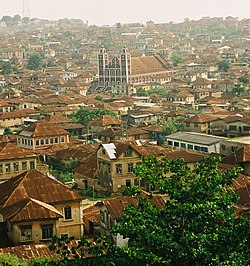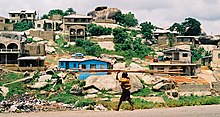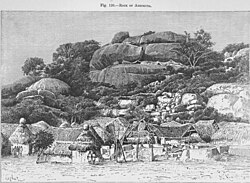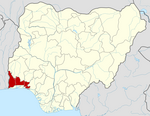Abeokuta
Abeokuta | |
|---|---|
 | |
| Country | |
| State | Ogun State |
| Population (2005) | |
• Total | 593,140 |
Abeokuta is the largest city and capital of Ogun State in southwest Nigeria and is situated at 7°9′39″N 3°20′54″E / 7.16083°N 3.34833°E, on the Ogun River; 64 miles north of Lagos by railway, or 81 miles by water. As of 2005, Abeokuta and the surrounding area had a population of 593,140.
Geography and agriculture
Abẹokuta lies in fertile country, the surface of which is broken by masses of grey granite. It is spread over an extensive area, being surrounded by mud walls 18 miles in extent. Palm-oil, timber, rubber, yams and shea-butter are the chief articles of trade. It lies below the Olumo Rock, home to several caves and shrines. The town depends on the Oyan River Dam for its water supply, which is not always dependable.[1]
History

Abeokuta (a word meaning "under the rocks"), dating from 1825, owes its origin to the inroads of the slavehunters from Dahomey and Ibadan, which compelled the village populations scattered over the open country to take refuge in among the rocks surrounding the city. Here they constituted themselves a free confederacy of many distinct groups, each preserving the traditional customs, religious rites and even the very names of their original villages.
The original settlers of Abeokuta were of the Egba nation.[2] Later, some members of other Yoruba clans came to the city. Baptist and Anglican missionaries operated in the area in the 19th century.[2]
In 1851 and 1864, the forces of Abẹokuta defeated Dahomean slave raiders.[2]
In 1893, the Egba United Government based in Abẹokuta was recognized by the United Kingdom. In 1914, the city was made part of the colony of Nigeria by the British.[2]

Notable people
The city is the birthplace and home-town of several famous Nigerians, including:
- Moses A. Majekodunmi Senator 1960, Minister of Health 1961-66, Administrator Western Region 1962 .
- Moshood Kashimawo Olawale Abiola, politician.
- Olusegun Obasanjo, President of Nigeria from 1999 to 2007.
- Funmilayo Ransome-Kuti, women's rights activist.
- Peter Olakeinde Sogbesan, Eminent Pioneering civil-servant.
- Fela Sowande, composer
- Wole Soyinka, Nobel Prize-winning author.
- Olikoye Ransome-Kuti, Professor of pediatrics, Former Minister of Health
- Amos Tutuola, author of The Palm-Wine Drinkard
- Fela Kuti, famous Nigerian musican and political activist.
References
- This article incorporates text from a publication now in the public domain: Chisholm, Hugh, ed. (1911). Encyclopædia Britannica (11th ed.). Cambridge University Press.
{{cite encyclopedia}}: Missing or empty|title=(help)

